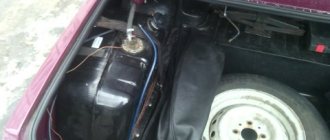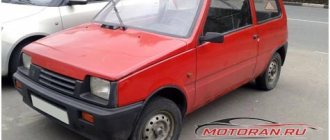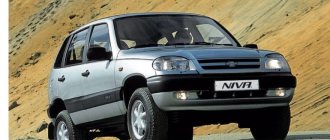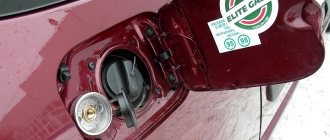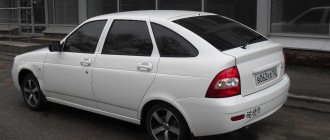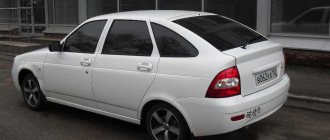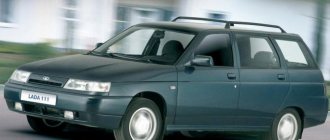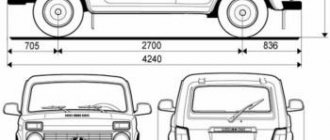Production of the VAZ 2105 began in 1980. With its appearance, the “five” was fully consistent with the fashion trends of passenger cars of the early 80s. Thus, the body has straight lines with aluminum bumpers, the headlights are voluminous and rectangular. In terms of maintenance, the VAZ 2105 is one of the most inexpensive models.
- Specifications
- VAZ 2105 engines
| Main settings | |
| Wheel formula / drive wheels | 4×2 / rear |
| Body type / number of doors | sedan / 4 |
| Car layout diagram | rear-wheel drive |
| Ground clearance (ground clearance), mm | 170 |
| Fuel tank volume, l | 39 |
| Trunk volume, l | 379 |
| Suspension and chassis | |
| Front suspension | independent, double wishbone |
| Rear suspension | dependent, spring |
| Tire size | 175/70 R13 |
| Front brakes | disk |
| Rear brakes | drums |
| Wheelbase | |
| Wheelbase, mm | 2424 |
| Front track width, mm | 1365 |
| Rear track width, mm | 1321 |
| Weight, load capacity, permissible loads | |
| Weight, kg | 995 |
| Permissible total weight, kg | 1395 |
| Steering | |
| Steering type | worm gear |
| Dimensions | |
| Length, mm | 4130 |
| Width, mm | 1620 |
| Height, mm | 1446 |
VAZ-2105 Tank volume, trunk Load capacity Fuel consumption
The ancestor of the second generation classic lived on the assembly line the longest life of all the models that trace their history back to the VAZ-2101. This brought interesting metamorphoses in its role in the history of the domestic automobile industry. All models from the VAZ-2101 to the VAZ-2107 are very similar to each other and have a common ancestor - the Fiat 124. And yet we can distinguish the first generation (relatively speaking, all models with round headlights) and the second (with rectangular ones).
Dimensions and specifications
Regardless of the configuration, the VAZ 2107 has the following dimensions:
– length – 4126,
– width – 1620,
- height - 1435.
- curb weight (how much is the weight of the car with equipment and materials) - 1030 kg,
- total weight (how much does a loaded car weigh with passengers and cargo) - 1430 kg
A motorist needs to know not only the standard parameters of his car, but also the control dimensions.
Control dimensions (points) are usually necessary when restoring a car after an accident. If you buy a used car, knowing these control dimensions, you can easily find out whether the car has been in an accident. This geometry will help in restoring the body, as well as other important parts.
The main control dimensions are described in detail in the diagram below:
The linear dimensions are clearly defined by the following diagram:
VAZ-2105 - tuning video
A person knowledgeable in design will notice that the difference is not only in the shape of the headlights: the body of the “five” is more angular (to suit the fashion of the second half of the 1970s), curved surfaces have become flatter, and the edges have become sharper. The overall proportions and even the longitudinal tilt of the body have changed. Most of the car's components were revised, so the unification of VAZ-2105 parts with previous models (2101, 2102, 2103 and 2106) is much less than with future ones (2104 and 2107). It was assumed that the VAZ-2105 would become a new sedan of the “norm” configuration (that is, a replacement for the VAZ-2101).
Changes in the fate of the “five” began when the country moved from a planned economy to a market economy. Unable to master new models, VAZ was forced to beat prices in order to survive - and here the model played an important role. Thanks to its manufacturability and investments in development that were “recaptured” a long time ago, it became one of the cheapest cars in Russia (and in the world), and when SeAZ discontinued the Oka, it became the cheapest.
The quality of production has seriously declined, but at all times it was possible to buy spare parts for a car of any quality at any price - from penniless basement ones to expensive imported ones, so each car enthusiast himself chose his own level of care for the car. The car was easily repaired by the owners, and the prices for repairs in services were and remain lower than for any other car.
The VAZ-2105 has become invincible in state competitions (traffic police fleet, post office, support programs for rural teachers, doctors), where price plays a major role. The equipment has been simplified to the maximum so that, God forbid, another manufacturer does not cross the road - in the “five” of recent years there is not even a daily mileage counter. Due to its low cost, the car was in demand in the West for some time and was even assembled in the UK. After the 2008 crisis, the program for recycling old cars again caused an explosion of interest in the “five” and forced VAZ, which was thinking about stopping its production, to extend it for another 2-3 years.
To meet the more stringent economic standards of the 21st century, the car was equipped with an injection engine. And in order to modernize the appearance, the VAZ-2105 car began to be offered in metallic colors. From an aesthetic point of view, this is a mistake: the design of the “five” was created in those years when there were no metallic paints, and metallic creates an unwinning play of glare, light and shadow. However, buyers liked this option. The end of the “five” came when the decision was made to transfer its production to IzhAvto. The plant re-evaluated the profitability of production and came to the conclusion that in the process of modernization, the VAZ-2105 practically ceased to differ from the VAZ-2107 and it was more profitable to produce one model. They left the VAZ-2107. This is an interesting fact: the VAZ-2106 and VAZ-2105 lasted on the assembly line for almost the same time, 30 and 31 years, respectively. However, the VAZ-2106, the last representative of the 1st generation of Zhiguli, had a circulation of more than twice as much.
Body features, dimensions of the “five”
The body of the VAZ 2105 is a one-piece supporting structure of the sedan type. It is designed in such a way that when the front or rear of the vehicle collides with an obstacle, the impact force is absorbed as a result of deformation of body parts. This is necessary to maintain an injury-proof space for the driver and passengers. All body parts are made of low-carbon steel sheet with a thickness of 0.7 mm by stamping, for the floor and roof - 0.9 mm, for load-bearing elements - racks, side members - 1.5 mm.
In order to reduce noise and enhance protection against corrosion, the underbody and wheel arches are covered with plastisol, and hidden cavities - sills - are treated with an anti-corrosion compound of the NGM-ML type. The 5's bumpers really did their job. Made of durable aluminum alloy with a rubber buffer, mounted on tubular elements, they adequately withstood the impact, protecting the body from deformation.
Dimensions of the fifth model:
| Length, mm | 4130 |
| Width, mm | 1620 |
| Height, mm | 1446 |
| Base, mm | 2424 |
| Front wheel track, mm | 1265 |
| Rear wheel track, mm | 1321 |
| Ground clearance, mm | 170 |
All modifications of the VAZ 2105 have similar dimensions, including the “Lux” version 2107 and the station wagon 2104.
Scheme of VAZ-21053 with generator 37.3701
1 — block headlights; 2 — side direction indicators; 3 - battery; 4 — starter activation relay; 5 — carburetor electro-pneumatic valve; 6 — carburetor microswitch; 7 - generator 37.3701; 8 — gearmotors for headlight cleaners*; 9 — electric motor of the engine cooling system fan*; 10 — fan motor activation sensor*; 11 — sound signals; 12 — ignition distributor; 13 — spark plugs; 14 — starter VAZ-2105; 15 — coolant temperature indicator sensor; 16 — engine compartment lamp; 17 — oil pressure warning lamp sensor; 18 — ignition coil; 19 — brake fluid level sensor; 20 — windshield wiper gearmotor; 21 — carburetor electro-pneumatic valve control unit; 22 — electric motor of the headlight washer pump*; 23 — electric motor of the windshield washer pump; 24 — brake light switch; 25 — windshield wiper relay; 26 — instrument lighting regulator; 27 — relay-breaker for alarm and direction indicators; 28 — reverse light switch; 29 — plug socket for a portable lamp**; 30 — cigarette lighter; 31 — glove box lighting lamp; 32 — mounting block (a jumper is installed instead of a short-circuit relay); 33 — lamp switches on the front door pillars; 34 — lamp switches on the rear door pillars; 35 — lampshades; 36 — parking brake warning lamp switch; 37 — switch for the carburetor air damper warning lamp; 38 — alarm switch; 39 — three-lever switch; 40 — ignition switch; 41 — ignition relay; 42 — external lighting switch; 43 — rear fog light switch; 44 — fog light circuit fuse; 45 — oil pressure warning lamp; 46 — instrument cluster; 47 — fuel reserve warning lamp; 48 — fuel level indicator; 49 — battery charge indicator lamp; 50 — coolant temperature indicator; 51 — control lamp for the carburetor air damper; 52 — parking brake warning lamp; 53 — control lamp block; 54 — rear fog light indicator lamp; 55 — control lamp for heated rear window; 56 — brake fluid level warning lamp; 57 - voltmeter; 58 — speedometer; 59 — control lamp for external lighting; 60 — turn signal indicator lamp; 61 — control lamp for high beam headlights; 62 — heater fan switch; 63 — rear window heating switch with backlight*; 64 — block for connecting the bar; 65 — heater fan electric motor; 66 — additional resistor of the heater electric motor; 67 — rear lights; 68 — pads for connecting to the rear window heating element; 69 — sensor for level indicator and fuel reserve; 70 — license plate lights.
Useful: Diagram VAZ-2170 – VAZ-21728 Lada Priora
Second version of the scheme
- block headlights
- side turn signal repeater
- battery
- lamp relay for monitoring battery charging
- electropneumatic valve
- carburetor microswitch
- generator
- headlight glass cleaner
- sound signal
- starter
- engine TDC indicator lamp
- engine compartment lamp
- oil pressure warning light sensor
- coolant temperature gauge sensor
- fluid level sensor in the hydraulic brake reservoir
- candles
- windshield washer pump motor
- distributor cap
- distributor
- ignition coil
- electric motor of the pump serving the headlight washers
- electronic control unit
- diagnostic block (installed on some cars)
- windshield wiper relay
- relay-interrupter for direction indicators and hazard warning lights
- wiper motor
- brake light switch
- electric motor of the heater (stove)
- additional resistance
- portable lamp socket
- reverse light switch
- Handbrake warning lamp switch
- relay and fuse box
- low beam headlight relay
- headlight high beam relay
- horn relay
- Relay for windshield wipers and headlight washers
- rear window defroster relay
- glove compartment lamp
- cigarette lighter
- dome light switches
- interior lamp
- rear window defroster switch
- hazard warning switch with warning lamp
- warning lamp block
- rear fog light warning lamp
- hand brake warning lamp
- warning lamp indicating a drop in brake fluid level
- windshield wiper and washer lever
- handbrake warning lamp relay
- horn switch
- outdoor light switch
- turn signal switch
- headlight switch lever
- egnition lock
- instrument light switch
- rear fog light switch
- instrument cluster
- warning lamp indicating insufficient oil pressure
- fuel reserve warning lamp
- fuel level indicator
- battery charging warning light
- water temperature indicator
- instrument lighting lamps
- voltmeter
- speedometer
- indicator lamp for turning on external lighting
- turn signal indicator lamp
- high beam warning lamp
- three-position heater fan switch
- rear window defroster
- fuel level and reserve indicator sensor
- rear light block
- license plate lights VAZ 2105
Identification data
The VAZ 2107 car, like any other car, has specific passport data, the liver of which is indicated in the table located under the hood on the air box.
The plate contains information about the vehicle model, engine number and body number, weight data and spare parts number. Above it is the vehicle identification number - VIN.
— The first 3 letters are responsible for the manufacturer’s code;
— 6 subsequent digits are the decoding of the car model;
— A letter or number of the Latin alphabet indicates the year of manufacture of the VAZ 2107 model;
— The last 7 digits are the required body number.
You will find the exact same number in the trunk.
Basic faults
- The engine does not start. In this case, several options for eliminating the breakdown are possible. The first thing you need to check is the presence of fuel in the VAZ 2105 carburetor. If there is fuel, you should carefully examine the fuel pump. It may become clogged or be completely faulty. If everything is fine with the pump, pay attention to the ignition system. If there are no problems with it, then the reason is a leak in the carburetor.
- The engine runs unevenly or begins to stall at idle. There may be several reasons for this problem. These include: incorrect adjustment of the idle speed in the engine, malfunctions in the carburetor, damaged drain pipe, worn gaskets, damaged pipeline hose, incorrectly set gaps, breakdown of the ignition system.
- The VAZ 2105 engine cannot develop full power. The reasons are as follows: the carburetor throttle valve is not fully open, the air filter is clogged, the ignition system is faulty. You need to check all these points to fix the problem.
These are the main malfunctions of the VAZ 2105 engine. It also does not hurt for a car enthusiast to remember how the car should be operated correctly.
At first, you should not use the maximum speed limit of the car. The driver needs to get used to driving the VAZ 2105. If you choose the wrong speed of the car when driving, you risk damaging the front suspension elements and causing the rear axle beam to bend. Also, at maximum driving speed, rapid tire wear is possible, and increased body vibration will lead to instability of the car.
Return to contents
Diesel modification
In 1999, in Tolyatti, a modification of the VAZ-21045 began to be produced in small series, with a VAZ-341 diesel engine produced by Barnaultransmash with a volume of 1.52 liters, with a high-pressure fuel pump from Bosch. Since 2005, it was planned to install a more powerful version of a 1.8 liter diesel engine, but these plans remained unrealized. The diesel modification was distinguished by a significantly higher cost and lower power of the power plant, despite the fact that in these years diesel fuel was noticeably cheaper than gasoline, the economic feasibility of purchasing this version was in doubt. In 2004, production of the VAZ-21045 was discontinued, and the remaining uninstalled diesel engines, in the amount of 500 pieces, were completed in a batch of the new modification of the VAZ-21055.
The main difference between these versions was that in the diesel version the main gearbox was replaced from 3.9 to 4.1, and there was additional sound insulation in the engine compartment, since the diesel engine made more noise during operation than the gasoline version. By replacing the front springs, the front suspension was strengthened. There was a new button on the dashboard that was responsible for heating the fuel filter, and an indicator for heating the glow plugs also appeared.
The Volzhsky Automobile Plant produced many classic and working models for private use. And if production began with sedans, then the first station wagon was the “four”. The new body and new capabilities of the model immediately attracted the attention of buyers.
Weight of passenger cars in tabular format
We present to your attention a table that shows the weight of the car by brand.
| car model | Curb weight |
| Weight of the Oka 1111 car, weight of the Okushka | 635 kg |
| Weight of the car Oka 1113 | 645 kg |
| Weight of a VAZ 2101 car, weight of a penny | 955 kg |
| Weight of the VAZ 2102 car | 1010 kg |
| Weight of the VAZ 2103 car | 965 kg |
| Weight of the car VAZ 2104, weight of tens 2110 | 1020 kg |
| The weight of the VAZ 2105 car, the weight of the five | 1060 kg |
| Weight of the VAZ 2106 car, weight of the six | 1045 kg |
| Weight of the VAZ 2107 car, weight of the seven | 1049 kg |
| Weight of the VAZ 2108 car | 945 kg |
| Weight of the VAZ 2109 car, weight of the nine | 915 kg |
| Weight of the VAZ 2111 car | 1055 kg |
| Weight of a VAZ 2112 car, weight of a twelve-wheeler | 1040 kg |
| Weight of the VAZ 2113 car | 975 kg |
| Weight of the VAZ 2114 car, weight of the four | 985 kg |
| Weight of the VAZ 2115 car, weight of the tag | 1000 kg |
| Weight of the VAZ 2116 car | 1276 kg |
| Weight of the VAZ 2117 car | 1080 kg |
| Weight of the Niva 2121 car | 1150 kg |
| How much does a Chevrolet Cruze weigh (Chevrolet Cruze weight) | 1285-1315 kg |
| How much does a Chevrolet Niva weigh (Chevrolet Niva weight) | 1410 kg |
| How much does a GAZ (Volga) weigh, the weight of a Volga is 24 | 1420 kg |
| How much does GAZ 2402, GAZ 2403, GAZ 2404 weigh? | 1550 kg |
| How much does GAZ 2407 weigh? | 1560 kg |
| Car weight Moskvich 314 | 1045 kg |
| Weight Moskvich 2140 | 1080 kg |
| Weight Moskvich 2141 | 1055 kg |
| Car weight Moskvich 2335, 407, 408 | 990 kg |
| How much does a UAZ 3962, UAZ 452 weigh, how much does a UAZ loaf weigh? | 1825 kg |
| How much does UAZ 469 weigh? | 1650 kg |
| How much does UAZ Patriot weigh? | 2070 kg |
| How much does UAZ Hunter weigh? | 1815 kg |
| How much does Nissan weigh (weight of nissan x-trail car) | 1410-1690 kg |
| How much does Qashqai weigh (weight of Nissan Qashqai car) | 1297-1568 kg |
| How much does a Nissan Juke weigh (Nissan Beetle weight) | 1162 kg |
| Ford Focus car weight (how much does a Ford Focus weigh) | 965-1007 kg |
| Weight of the Ford Focus 2 car (how much does the Ford Focus 2 weigh) | 1345 kg |
| Weight of the Ford Focus 3 car (how much does the Ford Focus 3 weigh) | 1461-1484 kg |
| Ford Kuga car weight (how much does a Ford Kuga weigh) | 1608-1655 kg |
| Weight of the Ford Escort (how much does the Ford Escort weigh) | 890-965 kg |
| Weight of the Renault Logan car (how much does the Renault Logan weigh) | 957-1165 kg |
| Renault Duster car weight (how much does a Renault Duster weigh) | 1340-1450 kg |
| Renault Sandero car weight (how much does a Renault Sandero weigh) | 941 kg |
| Weight of the Opel Mokka car (how much does the Opel Mokka weigh) | 1329-1484 kg |
| Weight of the Opel Astra car (how much does the Opel Astra weigh) | 950-1105 kg |
| Mazda 3 car weight (how much does mazda 3 weigh) | 1245-1306 kg |
| Weight of the Mazda CX-5 (how much does the Mazda CX-5 weigh) | 2035 kg |
| Mazda 6 car weight (how much does mazda 6 weigh) | 1245-1565 kg |
| Volkswagen car weight (how much does a Volkswagen Tuareg weigh) | 2165-2577 kg |
| Weight of a Volkswagen Polo car (how much does a Volkswagen Polo weigh) | 1173 kg |
| Weight of the Volkswagen Passat car (how much does the Volkswagen Passat weigh) | 1260-1747 kg |
| How much does a Toyota Camry weigh (weight of a Toyota Camry) | 1312-1610 kg |
| How much does Toyota Corolla weigh (weight of Toyota Corolla) | 1215-1435 kg |
| How much does a Toyota Celica weigh (Toyota Celica weight) | 1000-1468 kg |
| How much does a Toyota Land Cruiser weigh (Land Cruiser weight) | 1896-2715 kg |
| How much does the Skoda Octavia weigh (weight of Skoda Octavia) | 1210-1430 kg |
| How much does the Skoda Fabia weigh (Skoda Fabia weight) | 1015-1220 kg |
| How much does the Skoda Yeti weigh (Skoda Yeti weight) | 1505-1520 kg |
| How much does a Kia Sportage weigh (KIA Sportage weight) | 1418-1670 kg |
| How much does Kia Sid weigh (weight of KIA Ceed) | 1163-1385 kg |
| How much does the Kia Picanto weigh (KIA Picanto weight) | 829-984 kg |

